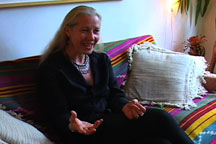 Dot Tuer has been writing about video art since the 1980s in the capacity of a theorist and cultural historian. Her work has focused on video art in Toronto, the famous artist-run Centre for Experimental Art and Communication (CEAC), technology, memory and global media.
Dot Tuer has been writing about video art since the 1980s in the capacity of a theorist and cultural historian. Her work has focused on video art in Toronto, the famous artist-run Centre for Experimental Art and Communication (CEAC), technology, memory and global media.
In this interview, she discusses her involvement with the Funnel, a seminal co-operative centre for filmmakers in Toronto that included filmmakers such as John Porter, Fast Wurms and Ross McLaren. She explores the relationship between artist-run centres and the rise of video art in the city, specifically at the artist-run A Space Gallery in the late 1980s. Tuer’s interest in video art as a whole surrounds the utopian ideals that pervaded video works and the ideological aspirations of artists in both their videos and writing. She discusses video art as a tendency that simultaneously rejected and carried on avant-garde film traditions, challenging traditional notions of moving image art works in the process. Tuer suggests that video artists in Toronto were primarily concerned with documenting the city and with identity as central themes.
As a professor at the Ontario College of Art & Design, Tuer has begun to see shifts in artists’ use of technology in Toronto as the result of social networking sites and discusses the relationship of video to the international art market. Tuer spends part of the year in Argentina and also speaks to the use of video by artists in Argentina as a social activist tool and its repression during the military dictatorship from 1976-1982.
She has contributed essays to countless anthologies and periodicals including Towards the Slaughterhouse of History: Working Papers on Culture (1992), Mirror Machine: Video and Identity (1995), The Institute™ Or, What We Do for Love (2003), and is the author of Caché du Cinema: Discovering Toronto Filmmakers (1985) and Mining the Media Archive: Essays on Art, Technology, and Cultural Resistance (2005). She has received Canada Council for the Arts and Ontario Arts Council awards for her writing.
- Eli Horwatt


